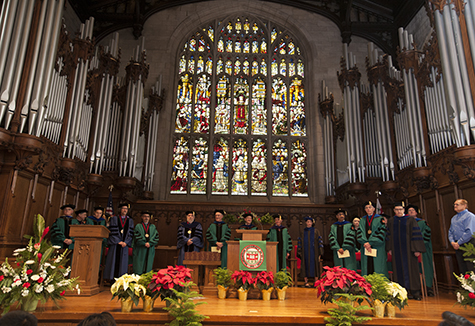
More than 275 Washington University in St. Louis degree candidates — the largest group to date — are expected to attend the December Recognition Ceremony at 1:30 p.m. Saturday, Dec. 5, in Graham Chapel on the Danforth Campus.
The ceremony will be led by Chancellor Mark S. Wrighton and John Drobak, JD, the George Alexander Madill Professor of Real Property and Equity Jurisprudence in the School of Law and professor of economics in Arts & Sciences, who will serve as grand marshal. Orvin Kimbrough, president and chief executive officer
of the United Way of Greater St. Louis, will deliver the address. The Chancellor’s Reception and individual school receptions will immediately follow in the Danforth University Center.
The ceremony shares many similarities to the Commencement exercises held each May. December Recognition has a solemn procession, excited graduates, proud relatives and inspiring remarks – but on a smaller scale. This allows graduates to have their names read by the grand marshal as they walk onstage and shake hands with the chancellor.
New to December Recognition this year: graduates may be wearing academic regalia. Thanks in part to the advocacy of
a trio of Brown School students, the candidates
have the option of wearing the traditional Washington University green
cap and gown.
Visitors to the ceremony should take note that most
ground floor seating in Graham Chapel will be reserved for the
graduates. Guests are invited to sit in the balcony or watch from nearby classrooms via live
streaming at commencement.wustl.edu as well as from their electronic devices.
Another similarity between both graduation ceremonies is the impressive number of outstanding graduates. Here’s a sample:
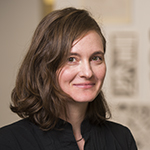
Andrea Godshalk, master’s degree candidate in landscape architecture and urban design in the Sam Fox School of Design & Visual Arts. An estimated 2.5 billion people live in impoverished urban areas with no access to adequate sanitation facilities. But after studying potential solutions as a Steedman Fellow in Kenya and Uganda, Godshalk is not deterred. She believes urban designers can transform massive problems into profitable, self-sustaining businesses, and in the process, create livable spaces that are generative and self-sustaining through community-owned bio-centers. Read more about Godshalk’s research in Class Acts on the Commencement website.
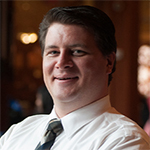
John S. Lentz, master’s degree candidate in public health at the Brown School. After graduation, Lentz begins his lifelong quest to improve health on a global scale. Through working in the emergency department of a large hospital, Lentz discovered he was a “big picture” person and that health administration was where his goals and abilities intersected. At Brown, he found the research, training and inspiration needed to make improvements in the administrative infrastructures of hospitals and health care systems that face public health challenges each day. Read more about Lentz’s work in Class Acts.
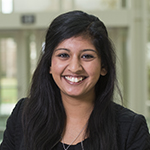
Khalyani Sankar, bachelor of science degree in economics and strategy at Olin Business School. Sankar first experienced the university’s warm sense of community while attending the High School Summer Experiences Program. As a student, she embraced her desire to create that sense of community for others. Whether serving as a student leader in the residence halls, helping her classmates navigate Olin’s study abroad programs, or assisting nonprofit organizations in developing businesses, Sankar used her professional expertise to make a positive social impact. Read more about Sankar’s work in Class Acts.

Monique Thomas, master of public health in the Brown School and master of business administration at Olin. Thomas is no ordinary Washington University graduate student. She loves taking complex problems and working toward solutions. In addition to pursuing both a master of public health and an MBA, Thomas also took a term off to work for the Ferguson Commission in the months following the non-indictment in the Michael Brown case. It was not an easy decision, but she has no regrets. Read more about Thomas’ work and on her plans for the future in Class Acts.
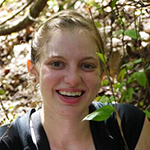
Emily Walco, bachelor of science degree candidate in anthropology in Arts & Sciences. Walco turned a lifelong love of animals into an anthropology degree, and brought her fascination to the field, studying Kinda baboons in Zambia’s Kasanka National Park for two summers. The experience not only reinforced her passion for fieldwork, but also brought home the consequences of poaching. Raising awareness about the need to protect wildlife will be an important component of Walco’s future research. Read more about Walco’s research in Class Acts.
Want to learn about more outstanding December graduates? Visit the Class Acts home page on the commencement.wustl.edu website.